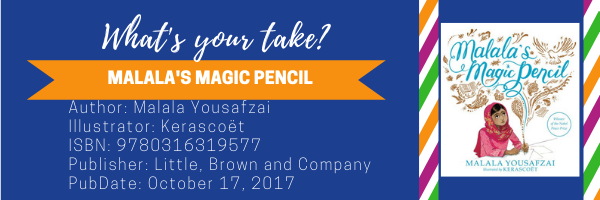Seemi Aziz, University of Arizona, Tucson, AZ, and Deanna Day-Wiff, Washington State University, Vancouver, WA
This week Seemi and Deanna discuss Malala’s Magic Pencil and her story of seeking education despite the dangers of doing os.
This is another story about the life of the Malala Yousafzai who stands for education for girls in struggling regions that belong to the ‘third’ world nations such as Afghanistan and Pakistan. She was shot by Taliban for what she stood for. This is her own story told by herself.
SEEMI: The book is beautifully illustrated with magical realism and gold accents. I appreciated that it began with giving an insight into her childhood and family and managed to highlight that she was a privileged girl who had access to education and a good life from the very beginning unlike others around her. It also projected her as a person who thought about others who were not of the same socio-political caliber as herself. What I did not appreciate and ended up questioning was the deliberate projection of herself as a savior further saved by the West, as she ends up in England where she continues her privileged life. There were three girls that were shot that day sitting next to Malala. I wonder what their stories were and are. Her story, further, reinforces multiple stereotypes of Muslim girls and Muslim male oppression of females, which is a cause of concern. Her story has been given so much attention internationally and globally that it becomes that one story that overtakes all other stories.
DEANNA: Seemi, I agree that the illustrations in this book are amazing with the gold accents. The patterned gold end pages and the floral golden accents on the first page and the proceeding pages add a very unique and royal touch. I also appreciate the realistic watercolor illustrations by Kerascoët that depict the trash dump where Malala sees a girl her age sorting trash into piles and boys looking for metal scraps and wonders why the girl does not attend her school. This is her first realization that she is fortunate in being able to go to school.
You bring up an excellent point Seemi. The privileged life that Malala has lived did not stand out to me the first, second or even third time I read this book. And I most likely wouldn’t have looked at this text critically without your take. Thank you!
Some other things I question include, the idea of a magic pencil that can erase war, poverty, hunger and gender equality. We know that a magic pencil isn’t going to be able to erase global issues and fortunately she alludes later that writing and words will do more. In the middle of the book she states that, “…instead of wishing for a magic pencil every night, I worked hard in school every day.”
Unfortunately working hard doesn’t always ensure success and stability for many people and children who do not live a privileged life.
My favorite part of this book is that Malala begins to write about her experience—sharing her story about how scared it was to walk to school with Taliban soldiers guarding the streets and holding weapons. Plus, hearing about the many classmates who dropped out of school because they feared the Taliban. Malala had a lot of courage to share her voice which opened up many peoples’’ eyes. She truly has sought action and change.
I, too, would like to hear other perspectives from the girls and boys of Pakistan. Her story does seem to take over so what other titles would you recommend teachers and families read?
SEEMI: We are lucky to have many more perspectives from life in Pakistan with authors such as Hena Khan, S.K. Ali, Asma Moinuddin and S.K. Senzai that come from Pakistan and India project a very different viewpoint. The issue with Malala is that she projects that one story that resonates and is accepted well with the international masses, thus, reinforcing accepted stereotypes.
Title: Malala’s Magic Pencil
Author: Malala Yousafzai
Illustrator: Kerascoët
ISBN: 9780316319577
Publisher: Little, Brown Books for Young Readers
PubDate: October 17, 2017
Throughout June 2021, Seemi Aziz and Deanna Day-Wiff discuss picturebooks that depict anxiety and stress in and around our world. Check back each Wednesday to follow the conversation!
- Themes: Deanna Day-Wiff, Kerascoët, Malala Yousafzai, Malala's Magic Pencil, Seemi Aziz
- Descriptors: Books & Resources, My Take/Your Take

